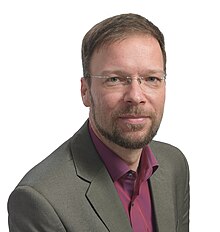
Thuringia, officially the Free State of Thuringia, is a state of central Germany, covering 16,171 square kilometres (6,244 sq mi), the sixth smallest of the sixteen German states. It has a population of about 2.1 million.

Jena is a city in Germany and the second largest city in Thuringia. Together with the nearby cities of Erfurt and Weimar, it forms the central metropolitan area of Thuringia with approximately 500,000 inhabitants, while the city itself has a population of about 110,000. Jena is a centre of education and research; the university was founded in 1558 and had 18,000 students in 2017 and the Ernst-Abbe-Fachhochschule Jena counts another 5,000 students. Furthermore, there are many institutes of the leading German research societies.

The Saale, also known as the Saxon Saale and Thuringian Saale, is a river in Germany and a left-bank tributary of the Elbe. It is not to be confused with the smaller Franconian Saale, a right-bank tributary of the Main, or the Saale in Lower Saxony, a tributary of the Leine.

Zeulenroda-Triebes is a German town in the district of Greiz in the state of Thuringia.
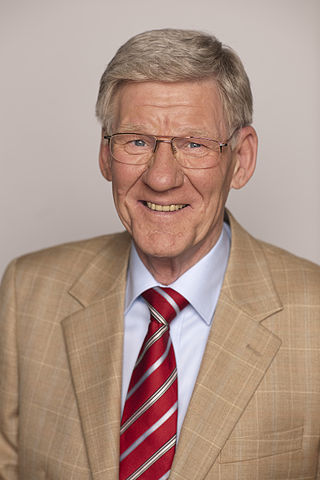
Volker Blumentritt is a German politician and member of the SPD.

Albersdorf is a municipality in the Saale-Holzland district of Thuringia, Germany. As of 2018, the population is 288.

Albrecht Schröter is a German politician of the Social Democratic Party of Germany (SPD) who served as mayor (Oberbürgermeister) of Jena from 2006 to 2018.

The Weimar–Gera railway is a line in the German state of Thuringia, connecting the city of Weimar via Jena, Stadtroda and Hermsdorf to Gera. It was built by the Weimar-Gera Railway Company, which was founded in June 1872, and the line was officially accepted into operation in June 1876.
The Ostthüringer Zeitung (OTZ) is a German newspaper covering eastern Thuringia with a head office in Gera. Together with the Thüringische Landeszeitung it has a daily circulation of 78,244 copies as of 2019, a 57.5% decrease since 1998.
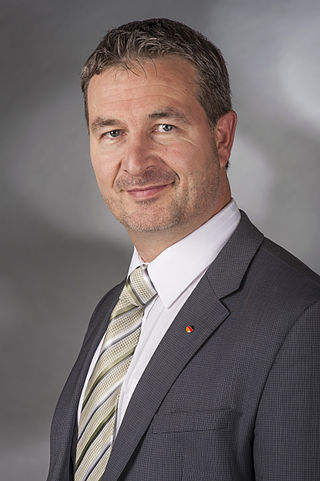
Albert Helmut Weiler is a German politician of the Christian Democratic Union (CDU) who served as a member of the German Bundestag from 2013 until 2021.

Wiebke Muhsal is a German politician with the Alternative für Deutschland (AfD). Since 2014, she is a member of the Landtag of Thuringia and deputy chairman of the AfD caucus. She is also her party's critic on family and education policy and is a member of the Parliamentary Committee on Education, Youth and Sports.
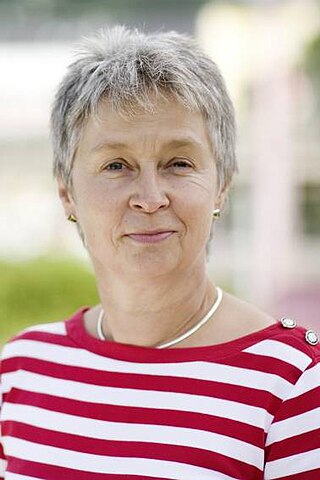
Gudrun Martha Lukin is a German politician and since 2009 a member of the Landtag of Thuringia representing The Left.

Peter Röhlinger is a German politician and member of the Free Democratic Party. From 1990 to 2006 he was the mayor (Oberbürgermeister) of the city of Jena and from 2009 to 2013 he was an elected representative in the Bundestag.

The Verkehrsverbund Mittelthüringen (VMT) is a transport association in central Thuringia, Germany. It comprises the cities of Erfurt, Weimar, Jena, and Gera, as well as parts of the districts of Weimarer Land, Sömmerda, Gotha, Ilm-Kreis, Saale-Holzland-Kreis, and Burgenlandkreis.

The next election to the Landtag of Thuringia is scheduled for 1 September 2024.
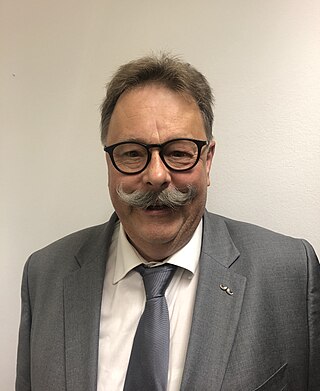
Reginald Hanke is a German politician of the Free Democratic Party (FDP) who served as a member of the Bundestag from the state of Thuringia from 2019 to 2023.

The 2020 Thuringian government crisis, also known as the Thuringia crisis, was triggered by the election of Thomas Kemmerich (FDP) as Thuringian Minister President with votes from the AfD, CDU and FDP on February 5, 2020. The election attracted considerable national and international attention because, for the first time in the history of the Federal Republic of Germany, a Minister President was elected with votes from a far-right populist party, in this case the AfD.

Saalfeld-Rudolstadt – Saale-Holzland-Kreis – Saale-Orla-Kreis is an electoral constituency represented in the Bundestag. It elects one member via first-past-the-post voting. Under the current constituency numbering system, it is designated as constituency 195. It is located in eastern Thuringia, comprising the districts of Saalfeld-Rudolstadt, Saale-Holzland-Kreis, and Saale-Orla-Kreis.

Frank Tempel is a German politician. He was a member of the German Bundestag from 2009 to 2017, where he was the drug policy spokesman for the Bundestag parliamentary group from May 2010. In January 2014, Frank Tempel was elected unopposed as deputy chairman of the Bundestag's Interior Committee. He was the first politician from Die Linke party to hold this post. From 2017 to 2019, he was head of the Domestic Violence Coordination Office in Thuringia. Since 2020, he has been back at the criminal investigation department in Gera.

Franka Hitzing is a German politician (FDP). She was a member of the Thuringian State Parliament from 2009 to 2014 and served as the state chairwoman of the FDP Thuringia from 2014 to 2015.
